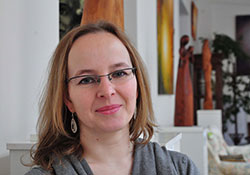Volunteering in Prague, Czech Republic

WHO/Malin Bring
Volunteering in a nursing home has made dance teacher Jana Voriskova discover new things about herself. "I've realized that I am good at communicating with elderly people, and on top of that my perception of ageing has deepened," she says.
We meet Jana Voriskova on a Saturday morning, half an hour before she is due to start her work at the Domov Sue Ryder private nursing home in Prague, where she works as a volunteer. The entrance hall of the home lies quiet and deserted, save for an elderly woman with a walker, who approaches us to ask if today is Monday, and how come the second-hand shop is not open. Jana Voriskova patiently explains to her that she has confused the days, and has to wait quite some time before the shop opens.
"What is so nice about working here is I can see that I'm doing something valuable. It is an enriching experience," says Jana Voriskova.
She is 29, works as an administrative assistant in the mornings and runs her own small dancing school, open three days a week, in the afternoons. A year and a half ago, she added volunteering to her list of work activities. "I had just left my previous job and wanted to try something new. I saw an advert about the position on a job-offering web site and thought it sounded interesting," she explains.
The advertisement asked for a volunteer to offer dance therapy to a group of older persons, but when Jana Voriskova applied, she was asked and agreed to act as personal friend to one of the residents in the nursing home as well.
Together with a group of other future volunteers, she underwent two days of training to prepare herself for the new tasks. "It was a sort of crash course in self-discovery, where our psychological stability and capacity to handle various situations were tested. It was held by a coordinator at the nursing home, whose job it is to look after all the volunteers."
After having run the dance therapy group for a while, alongside acting as a personal friend of a lady of 91 years, Jana Voriskova was forced to abandon the therapy group since her professional life outside the nursing home was becoming too demanding. Now she sees her elderly friend for an hour every week, and would not miss it for the world. "She can't concentrate for much longer than an hour at a time, but her mind is clear so we talk about how she feels and what she has been doing during the week. She doesn't have many people she can chat with, because most of her contemporaries in the home suffer from dementia."
The volunteers meet regularly to talk about their experiences with the elderly, and give each other support. They also receive individual supervision from the coordinator. "It's important that the work doesn't wear you out, but for me that hasn't been the case. I always come away from these visits with more energy than I had when I came."
What she has to offer her friend is companionship and a listening ear, which the professional staff does not often have time for, Jana Voriskova feels. What she gets in return is a more profound understanding and acceptance of ageing as a natural process in life. Moreover, volunteering to be a personal friend ties in with her own philosophy, she says: "I believe that if I treat others well I will be treated well myself, not least when I grow old."



